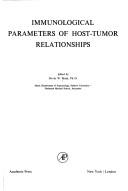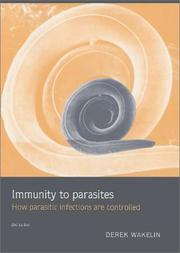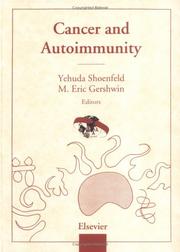| Listing 1 - 10 of 700 | << page >> |
Sort by
|
Book
ISBN: 0323549500 0323549489 9780323549509 9780323549486 Year: 2019 Publisher: St. Louis, Missouri : Elsevier,
Abstract | Keywords | Export | Availability | Bookmark
 Loading...
Loading...Choose an application
- Reference Manager
- EndNote
- RefWorks (Direct export to RefWorks)
Cancer --- Immunological aspects. --- Carcinogenesis --- Immunological aspects

ISBN: 0127435506 Year: 1971 Publisher: New York (N.Y.) : Academic press,
Abstract | Keywords | Export | Availability | Bookmark
 Loading...
Loading...Choose an application
- Reference Manager
- EndNote
- RefWorks (Direct export to RefWorks)
Book

ISBN: 162623907X 9781626239074 9781626239067 1626239061 1638535744 Year: 2019 Publisher: New York, New York : Thieme,
Abstract | Keywords | Export | Availability | Bookmark
 Loading...
Loading...Choose an application
- Reference Manager
- EndNote
- RefWorks (Direct export to RefWorks)
The quintessential how-to guide on treating allergies for day-to-day practice While encyclopedic tomes on the treatment of allergies have a place on the library shelves of otolaryngologists, Handbook of Otolaryngic Allergy provides a user-friendly office resource clinicians can consult on a daily basis. Written by Christine Franzese, Cecelia Damask, Sarah Wise, and Matthew Ryan, the book encompasses the basic science of allergies, essential knowledge, and how to perform each procedure. Part one starts with basic immunology and allergic rhinitis definition and classifications, followed by discussion of sensitivities vs. clinical allergies, the unified airway concept, and different classes of inhalant allergens. Parts two and three detail all aspects of diagnosis and diverse skin testing methods such as Specific IgE testing. Subsequent parts discuss current treatment methods, allergy emergencies such as anaphylaxis, atopic disorders, and professional issues clinicians must tackle to successfully incorporate allergy treatment into practice. Key Highlights The use of diverse types of pharmacotherapy including decongestants, anti-cholinergics, and antihistamines, as well as biologics, alternative medicines, and monosensitization vs. polysensitization Discussion of immunotherapy approaches including subcutaneous, sublingual, sublingual tablets, and oral mucosal Managing associated atopic disorders such as penicillin allergy, asthma, food allergies, eosinophilic esophagitis, and atopic dermatitis Worksheets with correct answers enable self-testing and accurate vial mixing/preparation This user-friendly reference is a must-have companion for otorhinolaryngology residents and practitioners at any stage of their careers who treat patients with allergies.

ISBN: 0521562457 Year: 1996 Publisher: Cambridge : Cambridge university press,
Abstract | Keywords | Export | Availability | Bookmark
 Loading...
Loading...Choose an application
- Reference Manager
- EndNote
- RefWorks (Direct export to RefWorks)
Book
Year: 1966 Publisher: Geneva : World Health Organization,
Abstract | Keywords | Export | Availability | Bookmark
 Loading...
Loading...Choose an application
- Reference Manager
- EndNote
- RefWorks (Direct export to RefWorks)
Book
ISBN: 917519533X Year: 2013 Publisher: Linköping : Linköping University,
Abstract | Keywords | Export | Availability | Bookmark
 Loading...
Loading...Choose an application
- Reference Manager
- EndNote
- RefWorks (Direct export to RefWorks)
Multi
ISBN: 9780128103883 0128103884 0128103876 9780128103876 Year: 2017 Publisher: London, England : Academic Press,
Abstract | Keywords | Export | Availability | Bookmark
 Loading...
Loading...Choose an application
- Reference Manager
- EndNote
- RefWorks (Direct export to RefWorks)
Thiamine Deficiency Disease, Dysautonomia, and High Calorie Malnutrition explores thiamine and how its deficiency affects the functions of the brainstem and autonomic nervous system by way of metabolic changes at the level of the mitochondria. Thiamine deficiency derails mitochondrial oxidative metabolism and gives rise to the classic disease of beriberi that, in its early stages, can be considered the prototype for a set of disorders that we now recognize as dysautonomia. This book represents the life's work of the senior author, Dr. Derrick Lonsdale, and a recent collaboration with his co-author Dr. Chandler Marrs.
Multi
ISBN: 9780128110744 0128110740 0128110732 9780128110737 Year: 2018 Publisher: London, United Kingdom : Academic Press, an imprint of Elsevier,
Abstract | Keywords | Export | Availability | Bookmark
 Loading...
Loading...Choose an application
- Reference Manager
- EndNote
- RefWorks (Direct export to RefWorks)
"Inflammation and Immunity in Depression: Basic Science and Clinical Applications is the first book to move beyond the established theory of cytokine-induced depression and explore the broader role the immune system plays in this devastating mood disorder. The book fully explores the most recent lines of research into this rapidly advancing field, including alterations of T-cells, the neurobiological implications of neuroinflammation and immune alterations for brain development and function, and the genetic components of neuroinflammation in depression, including the relationships between stress and inflammation that are revealing gene-environment interactions in the disorder."

ISBN: 9780444503312 0444503315 9781435601147 1435601149 0080528457 9780080528458 1281019011 9781281019011 9786611019013 6611019014 Year: 2000 Publisher: Amsterdam ; New York : Elsevier,
Abstract | Keywords | Export | Availability | Bookmark
 Loading...
Loading...Choose an application
- Reference Manager
- EndNote
- RefWorks (Direct export to RefWorks)
Of the two disciplines in parallel development for two decades, tumor immunology and transplantation immunology, the latter has thrived and has led to some of the most critical discoveries in immunobiology. The former continues to thwart both scientists and clinicians alike. The goal of immunologists in modern day research is to develop a simple and effective means to manipulate cancer in vivo, possibly encompassing several venues: identifying a phenotypic marker and the use of either active or passive immunization; include the use of passive reagents carrying ""warheads"" to select
Book
ISBN: 0808909541 Year: 1976 Publisher: London : New York : Academic Press ; Grune & Stratton,
Abstract | Keywords | Export | Availability | Bookmark
 Loading...
Loading...Choose an application
- Reference Manager
- EndNote
- RefWorks (Direct export to RefWorks)
| Listing 1 - 10 of 700 | << page >> |
Sort by
|

 Search
Search Feedback
Feedback About UniCat
About UniCat  Help
Help News
News